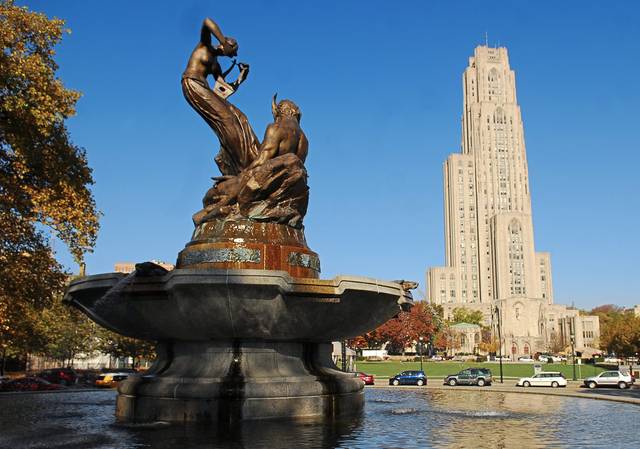The Pittsburgh Parks Conservancy pays the City of Pittsburgh $1 per year for Schenley Plaza, the popular five-acre park in the heart of Oakland that bustles with college students and families.
City workers cut the grass and provide routine maintenance. The Pittsburgh Parks Conservancy operates and maintains the plaza, a onetime parking lot that reopened as a park in 2006, a project initiated by the conservancy. In turn, the organization collects about $200,000 each year in rent from The Porch restaurant and about $60,000 per year for event rentals at the space, an audit by city Controller Michael Lamb’s office found.
The agreement between the conservancy and the city started in 2004 and ends in 2034.
“What a sweet deal,” Councilman Anthony Coghill said. “That is exactly what we’ve been talking about. To me, what that looks like is privatization, plain and simple.”
In a statement released Thursday evening, the conservancy applauded the audit, saying that “it yielded a positive conclusion: that the Parks Conservancy has become a trusted and reliable champion of city parks over the past 24 years and has contributed immensely to their development and preservation through its own fundraising and responsible management of city-provided funds.”
The situation with Schenley Plaza is one element city council members had questions about when they asked Lamb to perform the audit, ahead of legislation on how new parks tax revenue should be spent by the conservancy.
In response to attention focused on Schenley Plaza, the conservancy’s statement underlined that it is “responsible for all costs and expenses associated with the maintenance and operation” of the plaza. John Pepper, the conservancy’s communications director, noted it “was part of the community partnership that raised $13 million for its renovation. There were no city funds involved except the land.”
Voters approved the 0.5 mill property tax last year to pay for park improvements throughout the city.
The tax increase will cost city property owners $50 for every $100,000 of assessed value. The money generated, pegged at about $10 million per year, will be deposited into a trust fund and used exclusively for park improvements.
The new tax isn’t collected yet and won’t be until council passes legislation guiding how it will be spent, council President Theresa Kail-Smith said.
The Pittsburgh Parks Conservancy was established in 1996 on a model similar to the Central Park Conservancy in New York City, as a nonprofit that raises money independently to maintain and enhance the city’s parks. While its initial focus was the city’s large parks — Schenley, Frick, Highland, Riverview — the conservancy has expanded over the decades. The audit reported that since its founding, “the PPC has raised almost $130 million for park improvements with the largest revenue source coming from private donors and grants.”
The November 2019 referendum was sought by the conservancy to address what it called a $400 million backlog in maintenance for all city parks. The conservancy said that income generated by the tax would be matched by its fundraising and be dedicated to improving all parks, especially smaller ones in underserved neighborhoods. Coghill was among the vocal critics of the referendum, which passed with 52 percent of the vote.
Lamb released the audit on Thursday. “What we found was a little bit concerning to us,” he said.
Most of the 58 agreements the conservancy has with various city departments and other agencies weren’t readily available; 27 of them hadn’t been approved by council. Of those, only two agreements should have received a look by council, Lamb’s audit found, but they all should have been filed with the controller’s office and been available for public review.
Transparency isn’t just an aim by many city officials, Lamb said — it’s also required under Pittsburgh’s Home Rule Charter.
He didn’t blame the conservancy alone for these failures and noted that its staff were cooperative during the audit. Council and other city officials should have stepped forward and involved themselves in the conservancy’s operations, Lamb said.
Five members of the conservancy’s board can be appointed by the city, but those appointments haven’t been made, the audit found.
Had those members been appointed and if the officials with ceremonial seats on the conservancy board — Mayor Bill Peduto, Public Works Director Mike Gable, and Parks and Recreation Director Ross Chapman — had been more involved with the conservancy, “the city’s concerns would be more directly addressed.”
The audit was released in the middle of council’s August recess.
Coghill said he and his colleagues will be taking a deeper look at the audit before council acts on legislation that enables collection of the tax.
With the coronavirus pandemic, the economy has changed since the voters approved the tax in November, and Coghill said he was hesitant to raise people’s taxes during this time.
Kail-Smith agreed and said “the last thing people need” now is a tax increase.
Peduto will also be reviewing the audit, spokeswoman Molly Onufer said.
The city’s partnership with the conservancy has been outstanding and accomplished things the city couldn’t have done itself, Onufer said. She cited the city’s financial struggles between 2003 and 2018, when it was a distressed municipality under state Act 47.
The work with the Pittsburgh Parks Conservancy “has led to transformational projects like August Wilson Park in the Hill, Schenley Plaza, the Frick Environmental Center, the transformation of Allegheny Commons on the North Side and many more,” she said. “Through this partnership, it has been the residents that have benefited.”
Peduto’s office will review the audit and work to address the areas of concern, she said.
Other council members declined to comment until they had read the 56-page audit, which was packed with information, Lamb said.
“There’s a lot for us to see here,” Lamb said.
Catherine Qureshi, the conservancy’s acting chief operating officer, said in statement that “the audit confirms that the relationship between the City of Pittsburgh and the Pittsburgh Parks Conservancy has been both productive and efficient, resulting in enhanced park experiences through ongoing capital improvements, maintenance and programming. … It also provides added reassurance to our donors that the tens of millions of dollars they have contributed to the parks on our behalf have been thoughtfully and effectively managed.”











